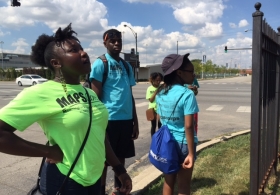
WBEZ/Susie An) (from left) Priscilla Agbeo, Uchenna Ngwe and Ashley Brown walk a neighborhood cataloging assets for MAPS Corps.
On a recent afternoon, University of Chicago field coordinator Priscilla Agbeo and her team of four students stood in the parking lot of a big warehouse in Chicago’s West Lawn neighborhood. Agboe wonders if the building is separate stores, or just one big store.
Cars whiz along South Pulaski Avenue as the students input the company “AFAM” into their mobile app. They make a note in their personal or borrowed smartphones that the business sells beauty products geared toward African Americans.
Over this summer about 90 Chicago public high school students mapped communities on the city’s South and West Sides. It’s part of a program called MAPS Corps run through the University of Chicago in partnership with After School Matters.
Students are paid to collect and analyze data on neighborhood assets including businesses, churches and educational institutions, observing their communities as researchers help the students understand it in a new way.
Recent Urban Prep graduate Rommel Slater explained that over the past few weeks they’ve talked with residents in South Side neighborhoods like Englewood and Chatham.
“What everyone wants is not necessarily what they need in a community,” Slater said.
Because, what a person says they want could be something that’s healthy for the community — but not for its residents.
Agbeo, a MAPS Corps alum herself, offered an example.
“We talk a lot about liquor stores for example, and fast food restaurants,” she said.
Bad food and booze seem like obvious unhealthy community options, but Agbeo challenged that idea.
“When you first think about it, you think that’s not healthy, but does it create jobs? Is it local?” she said.
MAPS Corps wants residents to know their local assets, even in communities that might be perceived as dangerous and disadvantaged.
While the students are out collecting data, a maintenance worker stops them to ask what they’re doing.
Walter Payton College Prep junior Uchenna Ngwe quickly explains.
“We go around the South Side, South and West Sides. We collect data about businesses so that people in the community can go to these businesses around them,” he said. “Like if you need a chiropractor, you don’t have to go all the way to the North Shore. You can just find one on the West Side.”
The maps generated over the past several years have been used by academic institutions, city departments and even private companies like Pepsi Co.
Each year builds on information gathered from the last. Students walk the neighborhoods to find out what assets are still in place and what’s changed. They also come up with a question of their own to add context to the data. Agbeo’s group was based out of the Greater Auburn Gresham Development Corporation.
“So right now, we’ve actually been discussing economic racism in our community,” Agbeo explained.
So, there’s a demand in the community for things like retail and grocery stores, but there aren’t many of either in the neighborhood.
“We’re still finding links to connect vacancies to economic racism,” Agbeo said.
She thinks businesses stay away because of high crime and poverty rates — her group wanted to show that in spite of that, vacancies have the potential for economic development.
Still, the students aren’t immune to the negative perceptions. One day they found a broken handmade sign near Damen Avenue and 71st Street.
“It was a sign that says, ‘I bet $100 that you n-words would commit 60 shootings and 20 murders in the Fourth of July.’ We have that posted in the room that we meet up,” Agbeo remembered.
Student Rommel Slater didn’t know who would’ve placed the sign, but it inspired him to act.
“It made me want to share what I see and overcome the stereotypes listed on that board,” Slater said.
And that’s what they did.
After weeks of mapping, Slater and other MAPS students presented their findings at a symposium Wednesday at the University of Chicago.
“We found that there’s a positive correlation between vacancies and the poverty rate, the violence rate and low property tax value,” he told the audience.
Because, as his fellow mapper Uchenna Ngwe explained, within the last month, 90 percent of residents they surveyed shopped outside of their neighborhood.
“This is all money flowing out of the community,” Ngwe began. “When these people shopped outside of their community, the places they shopped were predominantly grocery stores, restaurants and department stores, which accounted for almost 70 percent,” he explained.
The group’s recommendations included help for small businesses — from the city and community groups. And, that residents share the responsibility of cleaning up vacant lots--the students included themselves in that call to act.
Ninety-five percent of the mappers who graduated high school in 2015 will head off to college in the fall. They said they hope the information they provide can spur improvement — so they can come back to a better neighborhood.
Susie An is a WBEZ reporter. Follow her @soosieon